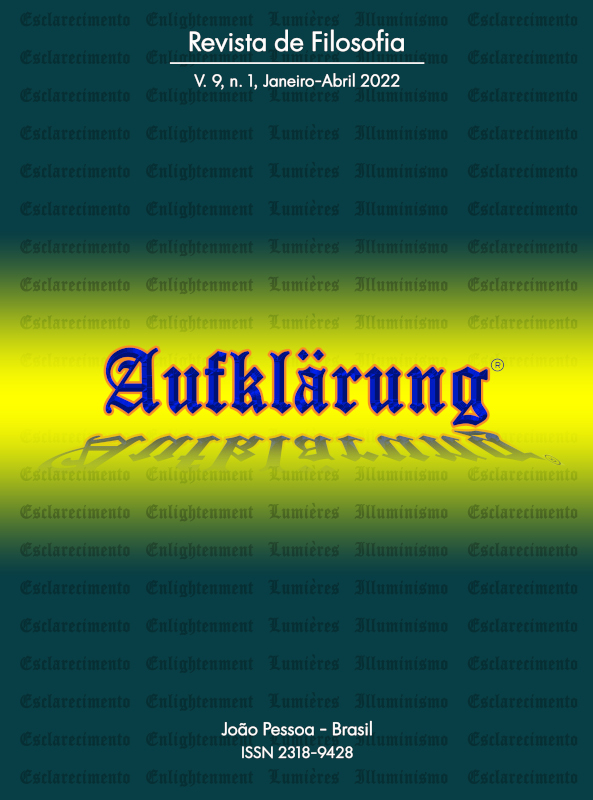O porblema do sujeito no idealismo-realista russo
DOI:
https://doi.org/10.18012/arf.v9i1.61495Keywords:
personality, religious philosophy, cognitive strategies, European philosophy, cultureAbstract
Este estudo visa resolver a questão do sujeito e do objeto no conhecimento onto-gnoseológico. O sujeito se desvela considerando sua inesgotabilidade no processo cognitivo. Esse conceito se correlaciona com características importantes do pensamento filosófico russo, como ponderar sobre a essência da personalidade, o status da verdade e seu lugar nos discursos sobre o processo cognitivo. A metodologia de pesquisa inclui métodos como análise e síntese, análise comparativa, o que permite fazer interpretações válidas dos fundamentos da realidade existente. Um método importante no artigo é a abordagem histórico-genética. O artigo mostra a transição do discurso da questão do sujeito para o tema da personalidade, que é um conceito ontológico e traz o pensamento para o âmbito da liberdade no conhecimento filosófico do mundo. O artigo demonstra como a filosofia russa se torna realismo ideal, que combina os conceitos mais importantes do pensamento filosófico. Esta pesquisa pode ser usada em estudos posteriores da filosofia russa. A análise de conceitos como intuição, perspectiva orgânica e pensamento discursivo é apresentada, e a questão da expressão pessoal de práticas cognitivas é levantada, o que expande os limites do conceito de sujeito e faz uma conexão entre epistemologia e ontologia. Mostra como o realismo ideal se torna a principal direção filosófica de seu tempo, e suas possibilidades no caminho para o conhecimento da verdade também são reveladas.
Downloads
References
ASTAPOV, S.N. ‘The contradictory unity of faith and reason in Christian theoretical thought HTS Teologiese Studies’, Theological Studies, vol. 75, n. 4, pp. a5273, 2019.
BODEA, R.-O. ‘Nikolai Berdyaev's Dialectics of Freedom: In Search for Spiritual Freedom’, Open Theology, vol. 5, n. 1, pp. 299-308, 2019.
FRANK, S.L. Writings. Moscow: Pravda, 1990.
FRANK, S.L. The subject of knowledge. Human soul. Moscow: AST, 2000.
GAISIN, A. ‘Solovyov’s metaphysics between gnosis and theurgy’, Religions, vol. 9, n. 11, pp. 354, 2018.
GOLOVANOVA, N.F. ‘Anthropological inconsistencies in educational characteristics: Comparative approach’, Perspektivy Nauki I Obrazovania, vol. 36, n. 6, pp. 10-17, 2018.
HEGEL, G.W.F. The phenomenology of spirit. Saint-Petersburg: Science, 1992.
HEIDEGGER, M. Being and Time. Moscow: Republic, 1993.
HEIDEGGER, M. Being and Time. Kharkiv: Folio, 2003.
HUGHES, R.A. ‘Nikolai Berdyaev’s Apophaticism’, St Vladimir’s Theological Quarterly, vol. 58, n. 2, pp. 441-455, 2014.
HUSSERL, E. The logical Investigations. Moscow: AST, 2000.
ILYIN, I.A. Axioms of Religious Experience. Moscow: AST, 2002.
INISHEV, I. ‘Heidegger and Russian philosophizing: The productivity of the distance Horizon’, Studies in Phenomenology, vol. 7, n. 2, pp. 546-553, 2018.
KANT, I. Critique of Pure Reason. Moscow: Thought, 1994.
KANT, I. Critique of the Power of Judgment. Moscow: Art, 1994.
KIEJZIK, L. ‘The beginnings of Berdyaev's critical marxism (in light of his unpublished correspondence with Kautsky)’, Bulletin of Saint Petersbutg University, Philosophy and Conflictology, vol. 34, n. 2, pp. 177-185, 2018.
LOSSKY, N.O. Selected Writings. Moscow: Pravda, 1991.
MALININ, S.A. ‘I.A. Ilyin as a philosopher and essayist’, Young scientist, vol. 15, pp. 417-419, 2014.
MALINOV, A.V. ‘Discourse of nature in Gregory Skovoroda's teaching’, Rivista di Estetica, vol. 67, n. 1, pp. 33-48, 2018.
MALINOV, A.V. ‘Vladimir Lamansky in Saint Petersburg University’, Bulletin of Saint Petersbutg University, History, vol. 64, n. 1, pp. 211-221, 2019.
OBORSKY, A.Y. ‘The national mentality in the history of philosophy’, XLinguae, vol. 11, n. 3, pp. 158-165, 2018.
PETKANIČ, M. ‘The concept of personality in the work of Russian philosopher Nikolai Alexandrovich Berdyaev (Climax of the personalistic line of Slavic thought)’, Konstantinove Listy, vol. 11, n. 1, pp. 130-137, 2018.
POLIPCHUK, D.S. ‘Some features of I. Ilyin’s philosophy of religion’, Bulletin of the Tambov State University. Series: Humanities, vol. 4, n. 132, pp. 15-21, 2014.
POLTORATSKY, N.P. Russian religious and philosophical thought of the XX century. Pittsburgh, 1975.
PYLAEV, M. ‘Prolegomena to any future religious studies that may appear as Christian religious studies’, Bulletin of Orthodox Sviato-Tikhonovsky Human Studies University, Series I: Theology, Philosophy, Religion Studies, vol. 80, pp. 119-126, 2018.
RICOEUR, P. History and Truth. Saint Petersburg: Aleteya, 2002.
ROJEK, P. ‘God and Cogito: Semyon Frank on the ontological argument’, Studies in East European Thought, vol. 71, n. 2, pp. 119-140, 2019.
SARTRE, J.-P. Being and Nothingness. Moscow: Republic, 2002.
SHAKHNOVICH, M.M. ‘The Discussion on Stoicism in Russian Thought of the second half of the 19th –early 20th century and the History of the Study of Christianity’, Bylye Gody, vol. 53, n. 3, pp. 1125-1133, 2019.
SOLOVIEV, V.S. Works in 2 volumes. Moscow: Mysl, 1988.
TENACE, M. ‘The Cultural and Ecclesial Implications of the Debate according to Vladimir Solovyov’, Obnovljeni život, vol. 74, n. 2, pp. 153-160, 2019.
ZENKOVSKY, V.V. History of Russian Philosophy. Moscow: EKSMO-Press, 2001.
Additional Files
Published
How to Cite
Issue
Section
License

This work is licensed under a Creative Commons Attribution 4.0 International License.
Journal general policy
1.This journal works under a Creative Commons License aplied to online journals. That icence can be read in the following link: Creative Commons Attribution 4.0 International (CC BY 4.0).
2.Accordingly to this License, a)the journal declares that authors hold the copyright of their articles without restrictions, and they can archieve them as post-print elsewhere. b)the journal allow the author(s) to retain publishing rights without restrictions.
Metadata Policy for information describing items in the repository
1. Anyone may access the metadata free of charge at anytime.
2.The metadata may be re-used in any medium without prior permission, even commercial purposes provided the OAI Identifier or a link to the original metadata record are given, under the terms of a CC BY license refered for the Journal.







































